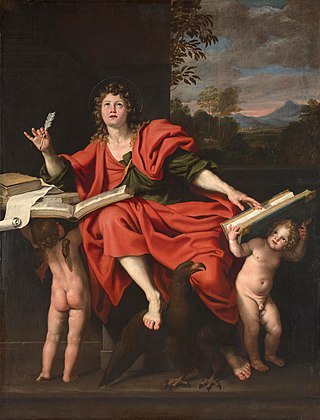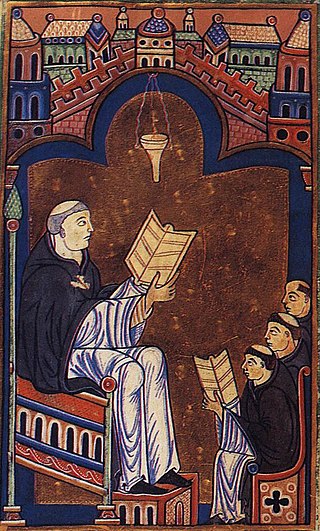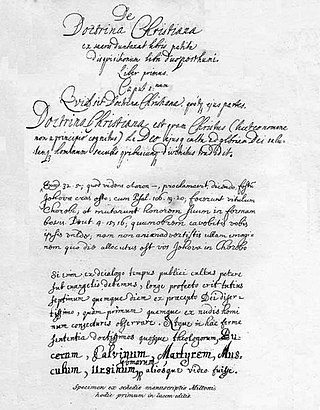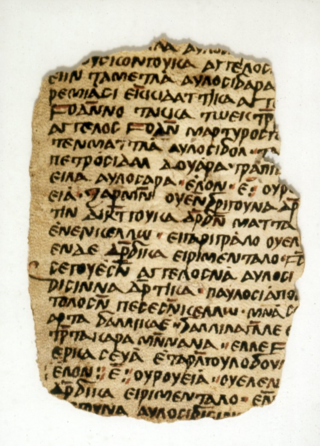Related Research Articles
Ambrosiaster or Pseudo-Ambrose is the name given to the unknown author of a commentary on the epistles of Saint Paul, written some time between 366 and 384 AD. The name "Ambrosiaster" in Latin means "would-be Ambrose". Various conjectures have been made as to Ambrosiaster's true identity, and several other works have been attributed to the same author, with varying degrees of certainty.

The Athanasian Creed — also called the Pseudo-Athanasian Creed or Quicunque Vult, which is both its Latin name and its opening words, meaning "Whosoever wishes" — is a Christian statement of belief focused on Trinitarian doctrine and Christology. Used by Christian churches since the early sixth century, it was the first creed to explicitly state the equality of the three hypostases of the Trinity. It differs from the Nicene-Constantinopolitan Creed and the Apostles' Creed in that it includes anathemas condemning those who disagree with its statements.

The First Epistle of Peter is a book of the New Testament. The author presents himself as Peter the Apostle. The ending of the letter includes a statement that implies that it was written from “Babylon”, which may be a reference to Rome. The letter is addressed to the "chosen pilgrims of the diaspora" in Asia Minor suffering religious persecution.
The New Testament (NT) is the second division of the Christian biblical canon. It discusses the teachings and person of Jesus, as well as events relating to first-century Christianity. The New Testament's background, the first division of the Christian Bible, is called the Old Testament, which is based primarily upon the Hebrew Bible; together they are regarded as Sacred Scripture by Christians.

Pseudo-Dionysius the Areopagite was a Greek author, Christian theologian and Neoplatonic philosopher of the late 5th to early 6th century, who wrote a set of works known as the Corpus Areopagiticum or Corpus Dionysiacum.

Theodoret of Cyrus or Cyrrhus was an influential theologian of the School of Antioch, biblical commentator, and Christian bishop of Cyrrhus (423–457).

Hilary of Poitiers was Bishop of Poitiers and a Doctor of the Church. He was sometimes referred to as the "Hammer of the Arians" and the "Athanasius of the West". His name comes from the Latin word for happy or cheerful. In addition to his important work as bishop, Hilary was married and the father of Abra of Poitiers, a nun and saint who became known for her charity.

Textus Receptus refers to the succession of printed Greek New Testament texts starting with Erasmus' Novum Instrumentum omne (1516) and including the editions of Stephanus, Beza, Elzevir, Colinaeus and Scrivener. Additionally, although not being derived from the work of Erasmus, some such as the Trinitarian Bible Society also associate the Complutensian Polyglot with the Textus receptus tradition.

The Johannine Comma is an interpolated phrase (comma) in verses 5:7–8 of the First Epistle of John.

The authorship of the Johannine works has been debated by biblical scholars since at least the 2nd century AD. The debate focuses mainly on the identity of the author(s), as well as the date and location of authorship of these writings.

Hugh of Saint Victor was a Saxon canon regular and a leading theologian and writer on mystical theology.
Gaius Marius Victorinus was a Roman grammarian, rhetorician and Neoplatonic philosopher. Victorinus was African by birth and experienced the height of his career during the reign of Constantius II. He is also known for translating two of Aristotle's books from ancient Greek into Latin: the Categories and On Interpretation. Victorinus had a religious conversion, from being a pagan to a Christian, "at an advanced old age".

Saint Victorinus of Pettau was an Early Christian ecclesiastical writer who flourished about 270, and who was martyred during the persecutions of Emperor Diocletian. A Bishop of Poetovio in Pannonia, Victorinus is also known as Victorinus Petavionensis or Poetovionensis. Victorinus composed commentaries on various texts within the Christians' Holy Scriptures.

The Revelation of the Magi is an early Christian writing in Syriac. It is part of the broader set of New Testament apocrypha, religious stories of early Christian figures that did not become canonized in the New Testament. The Revelation of the Magi is psuedepigraphically attributed to the testimony of the Magi, also known as the Wise Men, whose story appears in the Gospel of Matthew's account of the birth of Jesus. It is preserved as part of the Zuqnin Chronicle, an 8th-century Syriac religious history.
Gregory Baeticus was the bishop of Elvira, in the province of Baetica, Spain.

De Doctrina Christiana is a theological treatise of the English poet and thinker John Milton (1608–1674), containing a systematic exposition of his religious views. The Latin manuscript "De Doctrina" was found in 1823 and published in 1825. The authorship of the work is debatable. In favor of the theory of the non-authenticity of the text, comments are made both over its content, and it is difficult to imagine that such a complex text could be written by a blind person. However, after nearly a century of interdisciplinary research, it is generally accepted that the manuscript belongs to Milton. The course of work on the manuscript, its fate after the death of the author, and the reasons for which it was not published during his lifetime are well established. The most common nowadays point of view on De Doctrina Christiana is to consider it as a theological commentary on poems.
The authorship of the Petrine epistles is a question in biblical criticism, parallel to that of the authorship of the Pauline epistles, in which scholars have sought to determine the exact authors of the New Testament letters. The vast majority of biblical scholars think the two epistles do not share the same author, due to wide differences in Greek style and views between the two letters. Most scholars today conclude that Peter the Apostle was the author of neither of the two epistles that are attributed to him.
Anianusof Celeda was the deacon of a church at a place called Celeda in the early fifth century and a supporter of Pelagius. It is not known where Celeda was: candidates include Pannonia, Northern Italy, Campania, Syria, and Cyrenaica.
Pseudo-Augustine is the name given by scholars to the authors, collectively, of works falsely attributed to Augustine of Hippo. Augustine himself in his Retractiones lists many of his works, while his disciple Possidius tried to provide a complete list in his Indiculus. Despite this check, false attributions to Augustine abound.

Pseudo-Chrysostom is the designation used for the anonymous authors of texts falsely or erroneously attributed to John Chrysostom. Most such works are sermons, since more than 500 of John's actual sermons survive.
References
- 1 2 James A. Kellerman (2010). Thomas C. Oden (ed.). Incomplete Commentary on Matthew (Opus imperfectum). Ancient Christian Texts. Downers Grove, IL: IVP Academic. ISBN 978-0-8308-2901-9.
- ↑ James A. Kellerman, Thomas C. Oden, Incomplete Commentary on Matthew (Opus Imperfectum), InterVarsity Press, 2010, p. xx Google Books
- ↑ Corpus Christianorum. Series Latina. Vol. 87B. Turnhout, Belgium: Brepols. 1988.
- ↑ "Recherches sur le Tractatus in Matheum attribués à Jean Scot" in G. Van Riel; et al., eds. (1996). The Bible and Hermeneutics. Proceedings of the Ninth Colloquium of the Society for the Promotion of Eriugenian Studies. Leuven. pp. 321–350.
{{cite book}}: CS1 maint: location missing publisher (link) - 1 2 Landau, Brent (2010). Revelation of the Magi: The Lost Tale of the Wise Men's Journey to Bethlehem. HarperOne. The Meanings of the 'Revelation of the Magi'. ISBN 9780062020239.